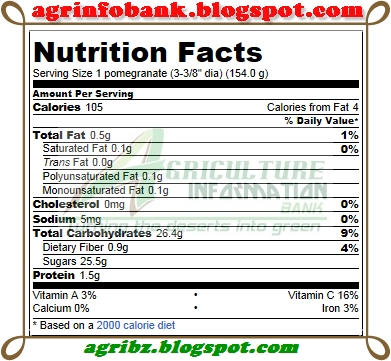Agriculture


- Mango Nutrition Facts: How A Mango Is Nutritious
?The king of the fruits," mango fruit is one of the most popular, nutritionally rich fruits with unique flavor, fragrance, taste, and heath promoting qualities making it a common ingredient in new functional foods often labeled ?super fruits." Mango is...
- Banana Fruit Nutrition Facts
Go for banana fruit, nature's own energy-rich food that comes in a safety envelope! Fresh, delicious bananas are available year around and in fact, one of the cheapest fruits. Botanically, the fruit belongs to the family of Musaceae.Commercially,...
- Banana Fruit Nutrition Facts
Go for banana fruit, nature's own energy-rich food that comes in a safety envelope! Fresh, delicious bananas are available year around and in fact, one of the cheapest fruits. Botanically, the fruit belongs to the family of Musaceae.Commercially,...
- Fruit Nutrition Facts
Why fruits?Fruits are nature?s wonderful medicines packed with vitamins, minerals, anti-oxidants and many phyto-nutrients (Plant derived micronutrients). They are an absolute feast to our sight, not just because of their color and flavor but their unique...
- Persimmon Fruit Nutrition Facts
Sweet, delicious persimmon fruits are rich in health promoting nutrients such as vitamins, minerals, and anti-oxidants that are vital for optimum health. Botanically, the fruit belongs to the family of Ebenaceaeof the genus: Diospyros. Scientific name:...
Agriculture
Pomegranate nutrition facts
Pomegranate is among the most popular, nutritionally rich fruit with unique flavor, taste, and heath promoting characteristics. Along with berries, and some tropical exotics such as mango, it too has novel qualities of functional foods often called as ?super fruits.?

Botanically, it is a small size fruit-bearing deciduous tree belonging within the Lythraceaefamily, of genus: Punica. The fruit is thought to originate in the Sub-Himalayan range of North India. Scientific name: Punica granatum.
The tree grows to about five and eight meters tall. It is cultivated at a commercial scale in vast regions across Indian sub-continent, Iran, Caucuses and Mediterranean regions for its fruits. Completely grown-up tree bears numerous spherical, bright red, purple, or orange-yellow colored fruits depending on the cultivar types. Each fruit measures about 6-10 cm in diameter and weighs about 200 gm. Its outer skin or rind is tough and features leathery texture.
Interior of the fruit is separated by white, thin, spongy, membranous, bitter tissue into compartments. Such sections, packed as sacs, filled with tiny edible sweet, juicy, pink pulp encasing around a single, angular, soft or hard (in over-mature fruits) seed.
Pomegranate is one of the most extensively cultivated fruits for food, juice, flavor, and color, making it a common ingredient in new functional foods often called ?super fruits."

Health benefits of Pomegranate
- The fruit is moderate in calories; 100 g provides 83 calories, slightly more than that in the apples. It contains no cholesterol or saturated fats.
- It is rich source of soluble and insoluble dietary fibers, providing about 4 g per 100 g (about 12% of RDA), which aid in smooth digestive and bowel movements. The fruit is suggested by nutritionists in the diet for weight reduction and cholesterol controlling programs. Regular inclusion of fruits in the diets boosts immunity, improves circulation, and offers protection from cancers.
- Punicalaginis a polyphenolic anti-oxidant compound found abundantly in the pomegranate juice. Studies suggest that punicalagin and tannins are effective in reducing heart-disease risk factors by scavenging harmful free radicals from the body.
- Total antioxidant strength of pomegranate fruit measured in terms of its oxygen radical absorbance capacity (ORAC) is 2341 µmol TE/100 g.
- The fruit is an also good source of antioxidant vitamin-C, provides about 17% per 100 g of daily requirement. Consumption of fruits rich in vitamin C helps the body develop resistance against infectious agents by boosting immunity.
- Regular consumption of pomegranate has also been found to be effective against prostate cancer, benign prostatic hyperplasia (BPH), diabetes, and lymphoma.
- Further, it is an also good source of many vital B-complex groups of vitamins such as pantothenic acid (vitamin B-5), folates, pyridoxine and vitamin K, and minerals like calcium, copper, potassium, and manganese.

- Mango Nutrition Facts: How A Mango Is Nutritious
?The king of the fruits," mango fruit is one of the most popular, nutritionally rich fruits with unique flavor, fragrance, taste, and heath promoting qualities making it a common ingredient in new functional foods often labeled ?super fruits." Mango is...
- Banana Fruit Nutrition Facts
Go for banana fruit, nature's own energy-rich food that comes in a safety envelope! Fresh, delicious bananas are available year around and in fact, one of the cheapest fruits. Botanically, the fruit belongs to the family of Musaceae.Commercially,...
- Banana Fruit Nutrition Facts
Go for banana fruit, nature's own energy-rich food that comes in a safety envelope! Fresh, delicious bananas are available year around and in fact, one of the cheapest fruits. Botanically, the fruit belongs to the family of Musaceae.Commercially,...
- Fruit Nutrition Facts
Why fruits?Fruits are nature?s wonderful medicines packed with vitamins, minerals, anti-oxidants and many phyto-nutrients (Plant derived micronutrients). They are an absolute feast to our sight, not just because of their color and flavor but their unique...
- Persimmon Fruit Nutrition Facts
Sweet, delicious persimmon fruits are rich in health promoting nutrients such as vitamins, minerals, and anti-oxidants that are vital for optimum health. Botanically, the fruit belongs to the family of Ebenaceaeof the genus: Diospyros. Scientific name:...
